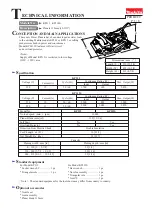
Page 146
Safety Checklist
Carefully go over each post, deck and component with bare
hands very carefully to detect any areas that may be sharp.
During installation and handling, there may be areas that were
hammered; causing rough areas that may be sharp. Use the
following list to check for problem areas:
•
Scrapes in metal pieces. Use steel wool, files or
sandpaper to smooth.
•
Spatter or burrs at all welded locations. Look closely
and smooth.
•
Scratches on the plastic parts. Look closely and smooth
with steel wool.
•
Edges and mold lines on plastic and aluminum parts
should be smoothed with steel wool or files.
•
Slide connection joints, smooth and fill if necessary
with outdoor clear caulk sealant. This applies to any
small opening that might be a “catch” or entanglement
point.
•
Sleeve ends, sometimes rough handling will cause
rough edges. Sand down rough areas if they exist.
Check that screws are seated.
•
Vinyl coated parts, check all areas to de-burr.
•
Roll pins; make sure they are flush and to not stick out.
•
Clamps, when aluminum is hammered, it can cause a
rough area. De-burr if necessary.
•
Bolt thread protrusions, two threads are maximum
protrusion allowed. If more than two threads are
visible, cut off and file smooth.
•
“T” nuts, should not stick out. Loosen and retighten.
•
Black top end caps, smooth down rough areas as
necessary.
•
If there are any nail or screw heads which are
improperly installed (bent or marred) remove and
replace.
•
Angle irons, check all corners for rough areas – sand if
necessary.
•
Set Screw, all setscrews should be flush with metal
surfaces. Check all and tighten.
•
Exposed concrete – all concrete should be poured
below grade. Backfill all of the footings with dirt.
•
Never ASSUME that hardware was tightened. Check
everything.
•
Touch up painted areas as needed.





































